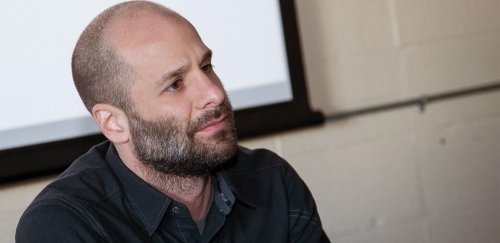
“Jay’s visit was an opportunity for our students, who are at the beginning of their filmmaking careers, to see and hear how challenging, unpredictable and, above all, rewarding this kind of work can be,” said Adjunct Professor Soren Sorensen.
Earlier this month, Producer/Director Jay Heyman lectured about the process of making his first feature-length documentary, “Bernie” (2005), before a RIC film studies class taught by Adjunct Professor Soren Sorensen.
Sorensen ’12, who is also a filmmaker and longtime friend of Heyman, composed the music for “Bernie,” which details the life of Heyman’s grandfather who grew up in a New York City orphanage.
“Jay’s visit was an opportunity for our students, who are at the beginning of their filmmaking careers, to see and hear how challenging, unpredictable and, above all, rewarding this kind of work can be,” said Sorensen.
Heyman said he started the project with only a bulletin board, push pins and three-by-five note cards with potential topics scribbled on the cards. The film took six years to make, Heyman said, because he had to work other jobs to pay the bills. Four of those six years involved editing the film.
One of the requisites of filmmaking, Heyman told students, is “empathy for your subject.” “I grew up hearing about my grandfather’s incredible life and was always fascinated by it,” he said. “When he finally wrote his biography, I decided to make a film about it. My grandfather died a year after I began shooting the film, a month shy of his 97th birthday.”
Heyman also noted that editing a documentary is where the writing begins. ”Unlike a movie, which begins with a storyboard and you shoot according to that storyboard, a documentary is written through editing and re-editing. I could have made 10 different films with the footage I had for ‘Bernie,’ which is why, during the editing process, you have to decide: What story am I telling? What message do I want to get across? And which footage most honors the message?” he said.
“Bernie” went on to win the Audience Award for the Best Feature Documentary at the 2005 Woods Hole Film Festival and the film’s success became Heyman’s portfolio for producing and directing in the future.
In 2006 he volunteered with two nongovernmental organizations to go to Uganda to produce and direct the short films – “The Kireka Children's Home” and “Ngamba Island Chimpanzee Sanctuary.”
From 2010 to 2011 he traveled to the Gulf of Mexico to produce the documentary “Black Tide: Voices from the Gulf” for the Animal Planet network, a film directed by acclaimed filmmaker Joe Berlinger.
Sorenson’s students are also making documentaries, with topics ranging from “embracing the LGBTQ community,” to “struggling visual artists within Rhode Island’s creative capital,” to “coping with cancer within the family.”
Heyman took time to workshop with the students on their projects.
“He gave us wonderful advice,” said Monay McNeil ’16. “He gave me tips on how to make my documentary more manageable by honing in on one subject so that the story is tighter and easier to follow.”
Through the editing process, “He reminded us that our films can and will change by the time we reach the final product,” said Dayle Decker ’16.
“And he was so passionate about his work that it made me feel inspired to pursue a career in filmmaking,” said Anastasia Lillpopp ’16.
